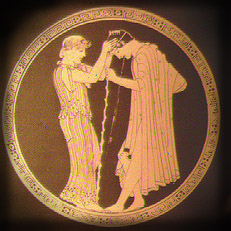|
|

A n c i e n t G r e e c e
So, we return to Ancient Greece and find that the name "laurel" is said to be connected with the Latin word "laus", meaning "praise",
but the origin of the associations of the name are Greek, where laurel is "dhafni", (named for the myth of the nymph Daphne, of course.
 In the Hebrew language, laurel leaves still retain the name "Alyei Dafna", meaning "the leaves of Daphne".
In the Hebrew language, laurel leaves still retain the name "Alyei Dafna", meaning "the leaves of Daphne".
Back in early times, the term `bacca-laureate` (meaning, `Laurel berries`) signified the completion of a bachelor degree. Newly
qualified Doctors received a laurel crown because it was considered a cure-all plant. In ancient Rome, the Emperor Tiberius always wore
a laurel wreath during thunderstorms, believing that it would protect him from the Deities or Gods ire, expressed in the despatch of
thunder and lightning.
So, what were the goals and the prize for Olympic athletes in the ancient Hellada? The Olympic victor was crowned (as shown on a picture
below) with an olive wreath (laurel wreath was the award for another of the Pan-Hellenic games, the Pythian games at Delphi) and had
his name inscribed in the official Olympic records.
 Olympic Champions became heroes in the eyes of the people, and conferred great honour upon their cities, who, in gratitude, would often
feed them for the rest of their lives although they were never paid. However, the symbolism of the wreath on the athletes head (similar
to that of Apollo) was the greatest reward, and far superior to the food.
Olympic Champions became heroes in the eyes of the people, and conferred great honour upon their cities, who, in gratitude, would often
feed them for the rest of their lives although they were never paid. However, the symbolism of the wreath on the athletes head (similar
to that of Apollo) was the greatest reward, and far superior to the food.
The Hellenic Goddess Nike, daughter of Pallas and Styx, was, like Apollo, associated with the Olympic Games, and according to commonly
held belief, was born before the games were first held, helped the Gods in their battles, and lived close to Zeus on the Mount Olympus.
 Normally painted with angelic wings and a `Golden` wreath upon her head, her worshippers believed that she would bring them victory.
Nikke, translated from the Greek language means `Victory`, and was later to become the symbol for the games
Normally painted with angelic wings and a `Golden` wreath upon her head, her worshippers believed that she would bring them victory.
Nikke, translated from the Greek language means `Victory`, and was later to become the symbol for the games
On the Left: Goddess Nikke © 2006 iStock Pro, used by permission.
• Top•
Homer (in Greek - Hómeros, 800 BC - 700 BC), the legendary poet, to whom we are grateful for writing the "Odyssey", "Epic Cycle",
"Trojan War" and "Oedipus" poems, also wrote his collection of "Homeris Hymns", each of which were dedicated to a different god. Here
is a brief quote from his "Hymn to Dionysis" (the god of wine and pleasure), where he has chosen to describe the importance of the
laurel wreath:
"...I begin to sing of ivy-crowned Dionysus, the loud-crying god, splendid son of Zeus and glorious Semele. The rich- haired
Nymphs received him in their bosoms from the lord his father, and fostered and nurtured him carefully in the dells of Nyssa, where by
the will of his father he grew up in a sweet- smelling cave, being reckoned among the immortals. But when the goddesses had brought him
up, a god oft hymned, then began he to wander continually through the woody coombes, thickly wreathed with ivy and laurel. And the
Nymphs followed in his train with him for their leader; and the boundless forest was filled with their outcry..."
The Greeks, unlike the Romans, never waged wars with the aim of occupying and enslaving neighbouring countries. Therefore, additionally
to the Sport tradition, the laurel wreath had a lot of weight for the politicians. Graduates and poets received wreaths of laurel, a
symbol of praise and scholarship. For the reason that Apollo been the god of poetry, his emblem, that of victory and clemency, became
the favourite of the poets, and hence of scholars, so that successful graduates of universities or other learned men became known as
laureates, (or, also, baccalaurei).
 Such graduates, laureates and baccalaurei, remained unmarried lest the duties of husband and father should take them from their
literary pursuits, and hence the term "bachelor" became extended nowadays to unmarried men in general. Despite the marvellous
omnipotence
of the laurel leaf, on occasions leaves from the olive tree, which had almost as much importance in ancient times, have replaced the
laurel. Ever since olive oil was discovered, it's beneficial and healthy side effects were obvious. The olives, unlike the laurel
leaves, are blooming and can be cut every other year.
Such graduates, laureates and baccalaurei, remained unmarried lest the duties of husband and father should take them from their
literary pursuits, and hence the term "bachelor" became extended nowadays to unmarried men in general. Despite the marvellous
omnipotence
of the laurel leaf, on occasions leaves from the olive tree, which had almost as much importance in ancient times, have replaced the
laurel. Ever since olive oil was discovered, it's beneficial and healthy side effects were obvious. The olives, unlike the laurel
leaves, are blooming and can be cut every other year.

|

 In the Hebrew language, laurel leaves still retain the name "Alyei Dafna", meaning "the leaves of Daphne".
In the Hebrew language, laurel leaves still retain the name "Alyei Dafna", meaning "the leaves of Daphne".
 Olympic Champions became heroes in the eyes of the people, and conferred great honour upon their cities, who, in gratitude, would often
feed them for the rest of their lives although they were never paid. However, the symbolism of the wreath on the athletes head (similar
to that of Apollo) was the greatest reward, and far superior to the food.
Olympic Champions became heroes in the eyes of the people, and conferred great honour upon their cities, who, in gratitude, would often
feed them for the rest of their lives although they were never paid. However, the symbolism of the wreath on the athletes head (similar
to that of Apollo) was the greatest reward, and far superior to the food.
 Normally painted with angelic wings and a `Golden` wreath upon her head, her worshippers believed that she would bring them victory.
Nikke, translated from the Greek language means `Victory`, and was later to become the symbol for the games
Normally painted with angelic wings and a `Golden` wreath upon her head, her worshippers believed that she would bring them victory.
Nikke, translated from the Greek language means `Victory`, and was later to become the symbol for the games
 Such graduates, laureates and baccalaurei, remained unmarried lest the duties of husband and father should take them from their
literary pursuits, and hence the term "bachelor" became extended nowadays to unmarried men in general. Despite the marvellous
omnipotence
of the laurel leaf, on occasions leaves from the olive tree, which had almost as much importance in ancient times, have replaced the
laurel. Ever since olive oil was discovered, it's beneficial and healthy side effects were obvious. The olives, unlike the laurel
leaves, are blooming and can be cut every other year.
Such graduates, laureates and baccalaurei, remained unmarried lest the duties of husband and father should take them from their
literary pursuits, and hence the term "bachelor" became extended nowadays to unmarried men in general. Despite the marvellous
omnipotence
of the laurel leaf, on occasions leaves from the olive tree, which had almost as much importance in ancient times, have replaced the
laurel. Ever since olive oil was discovered, it's beneficial and healthy side effects were obvious. The olives, unlike the laurel
leaves, are blooming and can be cut every other year.